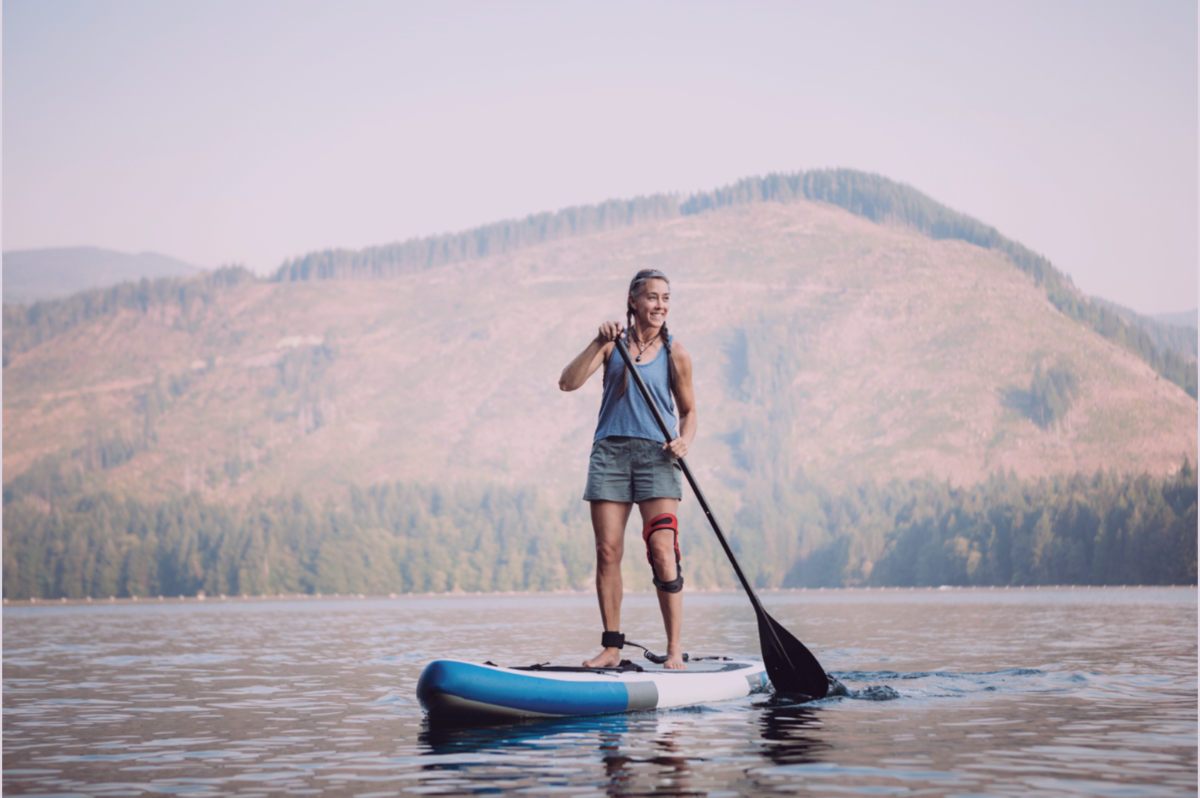Health enhancing physical activity in patients with hip or knee osteoarthritis

Paddling with Evoke brace
Osteoarthritis is the most common joint disorder. According to the World Health Organisation (WHO), 9.6% of men and 18% of women aged over 60 have osteoarthritis worldwide. The disease often results in pain and impaired mobility and it is one of the leading causes of disability around the world.
The core treatments of osteoarthritis consist of patient education, exercise and weight control. These basic treatments may be supplemented by pharmacological treatment and/or orthopaedic devices. Joint replacement should only be considered if the above mentioned treatments are insufficient.
| Background |
Osteoarthritis is one of the leading causes of inactivity worldwide. The recommended level of health enhancing physical activity (HEPA) is at least 150 min of moderate intensity physical activity per week.
The purpose of this study was to explore how the proportion of patients, who reached the recommended level of HEPA, changed following a supported osteoarthritis self-management programme in primary care, and to explore how reaching the level of HEPA was influenced by body mass index (BMI), gender, age and comorbidity.
| Methods |
An observational study was conducted using data from a National Quality Registry in which 6810 patients in primary care with clinically verified hip or knee osteoarthritis with complete data at baseline, 3 and 12 months follow-up before December 31st 2013 were included.
HEPA was defined as self-reported physical activity of at least moderate intensity either
- at least 30 min per day on four days or more per week, or
- at least 150 min per week.
HEPA was assessed at baseline, and again at 3 and 12 months follow-up. Cochran’s Q test was used to determine change in physical activity over time. The association between reaching the level of HEPA and time, age, BMI, gender, and Charnley classification was investigated using the generalized estimation equation (GEE) model.
| Results |
The proportion of patients who reached the level of HEPA increased by 345 patients, from 77 to 82%, from baseline to 3 months follow-up. At 12 months, the proportion of patients who reached the level of HEPA decreased to 76%. Not reaching the level of HEPA was associated with overweight, obesity, male gender and Charnley category C, i.e. osteoarthritis in multiple joint sites (hip and knee), or presence of any other disease that affects walking ability.
| Conclusions |
Following the supported osteoarthritis self-management programme, there was a significant increase in the proportion of patients who reached the recommended level of HEPA after 3 months. Improvements were lost after 12 months. To increase physical activity and reach long-lasting changes in levels of physical activity, more follow-up sessions might be needed.
| References |
Health enhancing physical activity in patients with hip or knee osteoarthritis – an observational intervention study, Anna Ernstgård, MirNabi PirouziFard and Carina A. Thorstensson. BMC Musculoskeletal Disorders 201718:42 DOI: 10.1186/s12891-017-1394-7
Barriers and facilitators to physical activity in people with hip or knee osteoarthritis: protocol for a systematic review of qualitative evidence, Archontissa M Kanavaki, Alison Rushton, Rainer Klocke, Abhishek Abhishek, Joan L Duda. BMJ Open. 2016; 6(11): e012049. Published online 2016 November 3. doi: 10.1136/bmjopen-2016-012049
Effectiveness and efficiency of an 11-week exercise intervention for patients with hip or knee osteoarthritis: a protocol for a controlled study in the context of health services research, Krauss I, Mueller G, Haupt G, Steinhilber B, Janssen P, Jentner N, Martus P. BMC Public Health. 2016 Apr 30;16:367. doi: 10.1186/s12889-016-3030-0
A Blended Intervention for Patients With Knee and Hip Osteoarthritis in the Physical Therapy Practice: Development and a Pilot Study, Bossen D, Kloek C, Snippe HW, Dekker J, de Bakker D, Veenhof C. JMIR Res Protoc. 2016 Feb 24;5(1):e32. doi: 10.2196/resprot.5049
